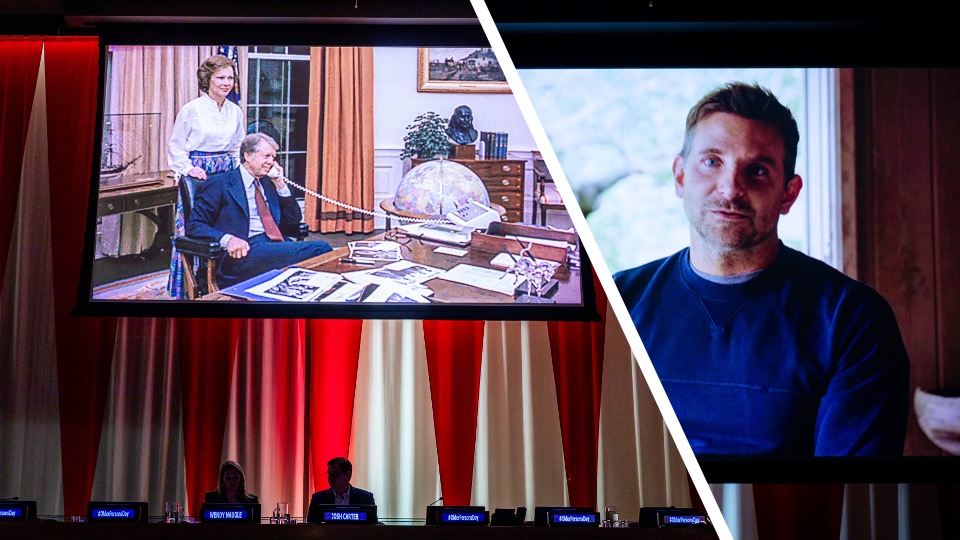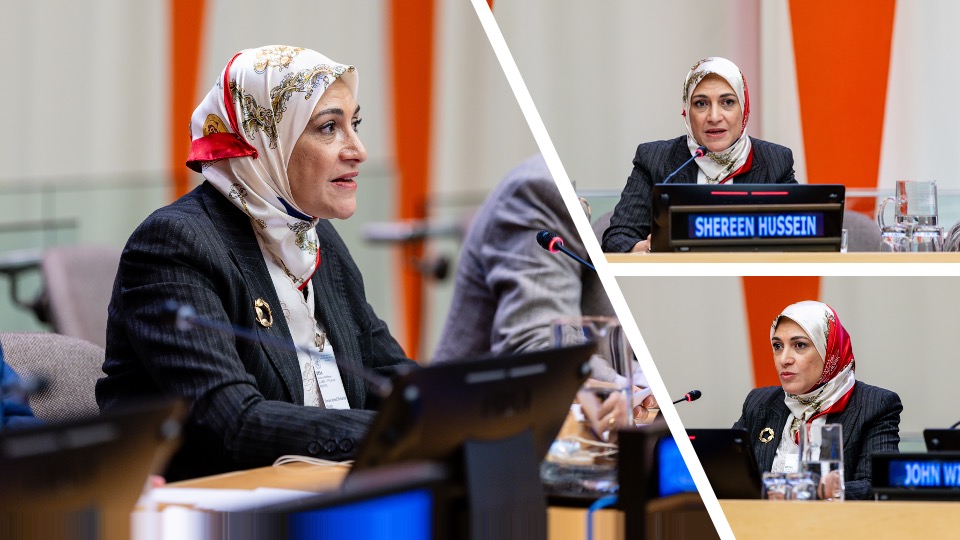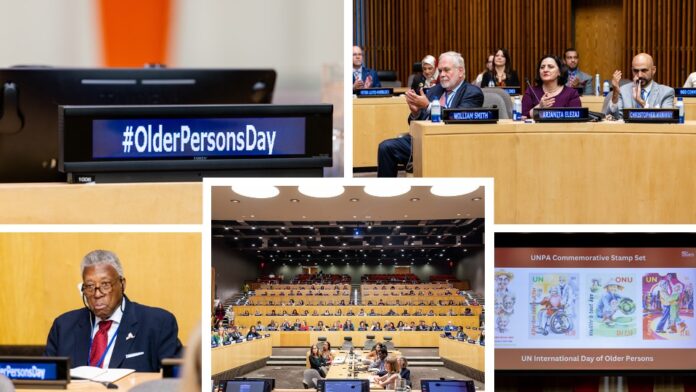On October 7, 2024, the United Nations celebrated the International Day of Older Persons with the theme “Ageing with Dignity.” The focus was on promoting the rights, inclusion, and dignified treatment of older individuals worldwide. This event gathered experts, policymakers, and advocates from various fields who are committed to addressing the challenges facing the ageing population while also highlighting their strengths.
The opening session, presided over by distinguished representatives, highlighted the global commitment to ageing with respect and inclusion. Among the speakers were H.E. Mr. Bob Rae, Permanent Representative of Canada and President of the UN Economic and Social Council; H.E. Mr. Ricardo Ernesto Lagorio, Permanent Representative of Argentina; H.E. Ms. Paula Narváez Ojeda, Permanent Representative of Chile and Chair of the Group of Friends of Older Persons in New York; and H.E. Mr. Abdulaziz M. AlWasil, Permanent Representative of Saudi Arabia.
In his address, Mr. AlWasil underscored the importance of preserving the dignity of older persons, advocating for integrated approaches to ageing that reflect local cultural values and support social and economic participation for older adults. His remarks aligned with the event’s mission statement, which emphasizes the collective responsibility to ensure that all people, especially older adults, are treated with dignity and respect, highlighting both the challenges and the potential of an ageing world.
The day’s programme also featured inspiring contributions from advocate Josh Carter and a preview of Bradley Cooper’s upcoming documentary on caregiving. Josh Carter, the grandson of president Jimmy Carter, known for his dedicated work on the platform Unchanging Principles, shared compelling insights into the importance of honouring the dignity and autonomy of older persons. His advocacy emphasises unwavering respect for older generations, encouraging policies and community support systems that acknowledge their lifelong contributions and ongoing needs. Carter’s message resonated deeply with the event’s theme of “Ageing with Dignity,” reinforcing the shared commitment to building inclusive environments for ageing populations.
Adding a cinematic perspective to the conversation, Bradley Cooper’s documentary trailer provided a poignant look into the lives of caregivers, highlighting the emotional and physical demands they face. The documentary aims to bring visibility to caregiving as a critical yet often overlooked aspect of the ageing experience, illustrating the profound impact caregivers have on the lives of older adults. Together, Carter’s advocacy and Cooper’s documentary underscore the multifaceted support required to truly honour and uplift older persons in society.

The work of MENARAH (Middle East and North Africa Research on Ageing and Health) drew significant attention. Through MENARAH, a network dedicated to ageing research in MENA, experts emphasized the region’s demographic uniqueness and the actionable strategies needed to create supportive environments for older persons and their families. Professor Shereen Hussein, the Founding Director of the MENARAH network, in her presentation titled “Embracing the Future: Addressing the Needs and Contributions of an Ageing Population in the MENA Region,” emphasised the unique demographic, social, and economic factors that influence ageing in the MENA region. Here, we delve into her contributions and recommendations for improving the lives of older persons and their families.

Understanding the Complex Dynamics of Ageing in MENA
Menarah’s research underscored that while the MENA region is marked by deep-rooted respect for older people, it is also rapidly evolving in ways that challenge traditional social structures. The region faces unique hurdles: ongoing conflicts, climate instability, and migration disruptions place older people at higher risk, mainly as they are often the least mobile in times of crisis. Rapid demographic shifts are also creating intense demands on healthcare and social support systems, with countries like Lebanon and Egypt experiencing ageing processes in just over a decade—transitions that took Europe nearly seventy-five years.
This accelerated pace has meant that many older people in MENA today are living longer than anticipated when they were younger, leading to a mismatch in longevity expectations and preparation. Professor Hussein illustrated this with data showing increased life expectancy but not necessarily increased healthy life expectancy, especially among women, who experience more years in poor health than their male counterparts. This highlights the need for policies that not only extend life but ensure those added years are lived in good health.
SHussein-UN-Oct24The Role of Intergenerational Solidarity
One of the most pressing calls from MENARH Network is a life-course approach to policy. By viewing ageing within an intergenerational framework, we argue that we can avoid tensions that might otherwise arise between younger and older populations. “The youth of today are the older persons of tomorrow,” emphasising the importance of fostering a positive perception of ageing from an early age to reduce age-related biases and societal pressures.
In line with this, she noted that social connections among the older population in the MENA region are weaker than those in other parts of the world, contributing to feelings of isolation. Strengthening these bonds, she suggested, would provide vital social support and mental health benefits for older persons, reducing reliance solely on family-based caregiving systems and fostering a more supportive community structure.
The MENARAH network hosted a pivotal Regional Symposium in April 2024, in collaboration with the International Association of Gerontology and Geriatrics (IAGG), which focused on the development of sustainable long-term care markets in MENA. This event examined social connections and underscored the need for strengthened community and intergenerational support. Findings shared by research on social connections show that without interventions to enhance social connections, older adults remain vulnerable to loneliness and health disparities.
Moving Beyond Traditional Family Support
Recognizing the evolving nature of family structures in MENA, MENARAH advocates for formalised care systems to relieve the burden on family caregivers. This formalisation presents economic opportunities for younger people, creating jobs in caregiving, while providing older adults with the autonomy to live with dignity and choice. Encouraging progress has been seen with Oman and Saudi Arabia’s national ageing strategies, and Egypt’s discussions on a new law for older persons. MENARAH continues to lead efforts to ensure all MENA countries can meet the challenges of a rapidly ageing population.
Recommendations for a Dignified Ageing Process in MENA
In closing, Professor Hussein emphasised that while policies are moving in the right direction, more needs to be done. She urged swift, coordinated efforts from governments, civil society, and the international community to address ageing populations’ immediate and future needs.
Here are several important suggestions drawn from her presentation to enhance the quality of life for older individuals in the MENA region:
- Mainstream Ageing into All Policies: By integrating ageing considerations into health, economic, and education policies, governments can create a more inclusive society that respects and supports older individuals at every life stage.
- Expand Formal Care Systems: Formalized caregiving infrastructure will relieve the burden on family caregivers, create job opportunities, and enhance the quality of care available to older persons.
- Invest in Healthy Longevity: Ensure that added years are healthy by addressing healthcare access disparities, especially for women, through targeted public health interventions.
- Strengthen Social Connections: Combat isolation among older persons by promoting community engagement programs and intergenerational activities that reinforce social bonds and reduce loneliness.
- Foster Positive Ageing Perceptions: Create awareness campaigns highlighting the value of ageing and combat ageism, nurturing a culture of respect that benefits current and future generations.
The International Day of Older Persons was a call to action and a reminder that ageing is a shared human experience. With Professor Hussein’s insights as a guide, MENARAH continues to lead efforts to create a MENA region where ageing is not only acknowledged but celebrated and supported at every level. Together, through policy innovation and societal commitment, we can ensure that every older person lives with dignity, purpose, and security.
Watch the whole event, Professor Hussein’s keynote starts at 2:46:41
Photo Credit: All photos by Brett Deutsch, www.deutschphoto.com
Director of Analytical Research Ltd, and Affiliate Research Fellow, Oxford Institute of Population Ageing, University of Oxford, United Kingdom
Mohamed is trained in engineering (MEng – Cairo University), computer science (MSc – Cairo University) and mathematical finance (MSc – CASS Business School, University of London). Mohamed started his career in in the City of London in 1990s, working as a quantitative analyst for leading global financial organisations, such as Merrill Lynch, HSBC, Mizuho and Credit Suisse, before he began to shift his focus onto quantitative social research. Since 2009, he has worked as an independent researcher in the field of social sciences with a particular drive to make use of different statistical and mathematical modelling techniques for the analysis of large and multi-dispersed data sets.
He has worked with universities in the UK, Europe, Australia and the Middle East; publishing a number of peer-reviewed articles. He has also been invited to give talks and presentations at several leading universities and organisations. His current research interests focus on exploring the potential role of mathematical dynamical systems in the field of population ageing across health and social care. Mohamed is the Director of Analytical Research ltd and an affiliate at the Oxford Institute of Population Ageing, University of Oxford.






